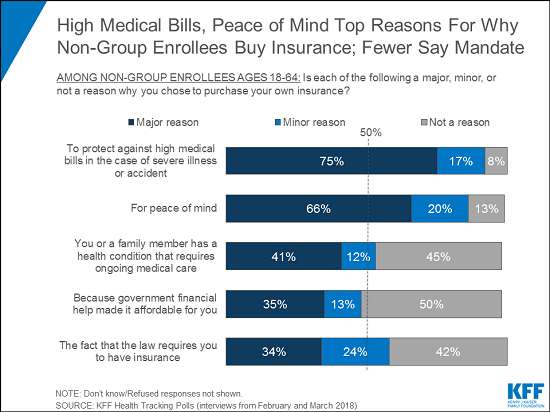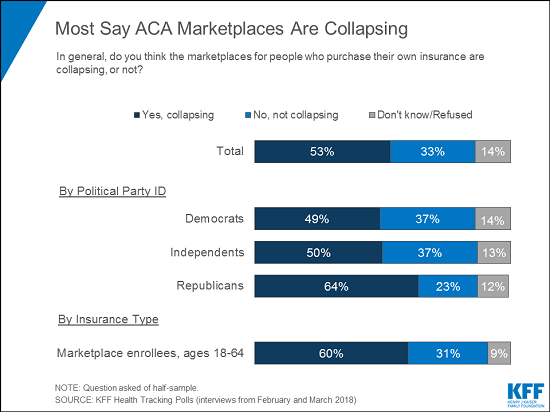|
Just Released
|
||
|
Poll: Survey of the Non-Group Market Finds Most Say the Individual
Mandate Was Not a Major Reason They Got Coverage in 2018, And Most Plan
to Continue Buying Insurance Despite Recent Repeal of the Mandate
Penalty
A
Majority of ACA Marketplace Enrollees Perceive the Marketplaces As
“Collapsing,” But Most Say They Are Not Paying More for Coverage Compared to
Last Year
Very
Few Say They Would Want to Purchase a Short-Term Plan, A Regulation Being
Drafted By The Trump Administration
Nine in 10 enrollees in the non-group market say
they intend to continue buying their own insurance even after being told that
Congress has repealed the individual mandate penalty for not having coverage
as of 2019, according to a new survey by the Kaiser Family Foundation. The
survey finds the mandate, part of the Affordable Care Act, ranks low among
the reasons people give for buying their own insurance in 2018.
The survey also finds a lack of awareness about
the status of the mandate penalty, with 1 in 5 non-group enrollees (19%)
saying they are aware the penalty has been repealed but is still in effect
for this year. The mandate continues to rank far down on a list of “major
reasons” people give for buying their own insurance, below reasons such as
protecting against high medical bills (75%), peace of mind (66%), or because
they or a family member has an ongoing health condition (41%).
At a time when the ACA is often labeled as
“failing” by its critics in Congress and the Trump administration, the survey
also finds that about half of the public say they believe the ACA
marketplaces are “collapsing” (53%, up from 42% in January) -- including 6 in
10 who purchase insurance through the marketplaces. Across party
identification and insurance type, more say the marketplaces are collapsing
than say the marketplaces are not collapsing. Recent figures show that insurers in the marketplaces
are now turning a profit, but repeal of the individual mandate penalty and
other policy changes put forth by the Trump administration would create
greater volatility next year.
In addition, the poll finds at least half of
non-group enrollees in general and marketplace enrollees specifically are
worried about the future of health insurance availability and costs in their
areas. Fifty-one percent of all non-group enrollees and 58 percent of
marketplace enrollees say they are “very worried” or “somewhat worried” there
will be no insurance companies left selling plans in their area in the
future, and similar shares worry that their current insurance company will
stop selling plans in their area (49% and 58%, respectively).
Despite
Overall Pessimism About The Future of the ACA Marketplaces Generally, Most
Say Their Premiums Have Not Increased and Are Satisfied with Available
Options
When asked about their own experience, however,
most marketplace enrollees say their premiums have not gone up in 2018.
One-third (34%) say their premiums are “about the same” as last year and a
fourth (23%) say their premiums went down, while four in ten (42%) say their
premiums have increased. These breakdowns are similar to the share of the
overall non-group market who say their premiums have increased (46%), stayed
the same (35%), or decreased (18%).
In the marketplaces, this is likely attributable
to the federal tax credits most enrollees receive to help cover premium costs
and protect against steep increases. It also may reflect a “silver loading”
strategy in which many states, concerned about the possibility of large
premium hikes due to the loss of federal cost-sharing reduction payments,
concentrated insurers’ premium increases on the silver benchmark plans that
help determine the level of federal financial assistance available to
enrollees.
The majority of marketplace enrollees (60%) say
their deductibles are about the same as last year. Three in ten saw an
increase in their deductibles and few (8%) say they experienced a decrease.
In addition, a majority of marketplace enrollees
(61%) say they were satisfied with their insurance options for 2018 and most
(68%) said they did not experience problems during the open enrollment
period.
Few
Non-Group Enrollees Say They Would Prefer Short-Term Insurance Plans
The survey also finds little appetite among
current marketplace enrollees for the non-renewable short-term insurance
plans that President Trump has recently sought to expand access to through an
executive order and newly proposed regulations. Such plans tend to cost less
than ACA plans but provide fewer benefits, and are exempt from ACA
requirements that insurers accept all applicants and cover pre-existing
conditions.
When asked whether they would want to purchase
such a plan or keep the plan they have now, the vast majority of non-group
enrollees (84%) say they would keep the plan they have now, while 12 percent
would want to purchase a short-term plan. Responses were similar among
individuals living in households both with and without pre-existing
conditions.
The new survey examines people’s experiences with
the current health insurance market focusing on individuals who have health
insurance they purchased themselves in the non-group market. It also compares
the experiences of these individuals to those people who get their insurance
through their employer as well as those who do not have health insurance
coverage.
The survey was designed and analyzed by
researchers at KFF. Telephone interviews were conducted from February 15-20
and March 8-13 among a nationally representative random sample of 2,534 adult
U.S. residents (882 via landline and 1652 via cell phone), including an
oversample of respondents who purchase their own insurance (Non-Group
Enrollees). The margin of sampling error is plus or minus 2 percentage points
for the full sample, plus or minus 7 percentage points for all non-group
enrollees, and plus or minus 9 percentage points for marketplace enrollees.
For other subgroups, the margin of sampling error may be higher.
Filling
the need for trusted information on national health issues,
the Kaiser Family Foundation is a nonprofit organization based in San
Francisco, California.
|
||
|
||
To be a Medicare Agent's source of information on topics affecting the agent and their business, and most importantly, their clientele, is the intention of this site. Sourced from various means rooted in the health insurance industry - insurance carriers, governmental agencies, and industry news agencies, this is aimed as a resource of varying viewpoints to spark critical thought and discussion. We welcome your contributions.
Tuesday, April 3, 2018
Survey of the Non-Group Market Finds Most Say the Individual Mandate Was Not a Major Reason They Got Coverage in 2018
Subscribe to:
Post Comments (Atom)





No comments:
Post a Comment